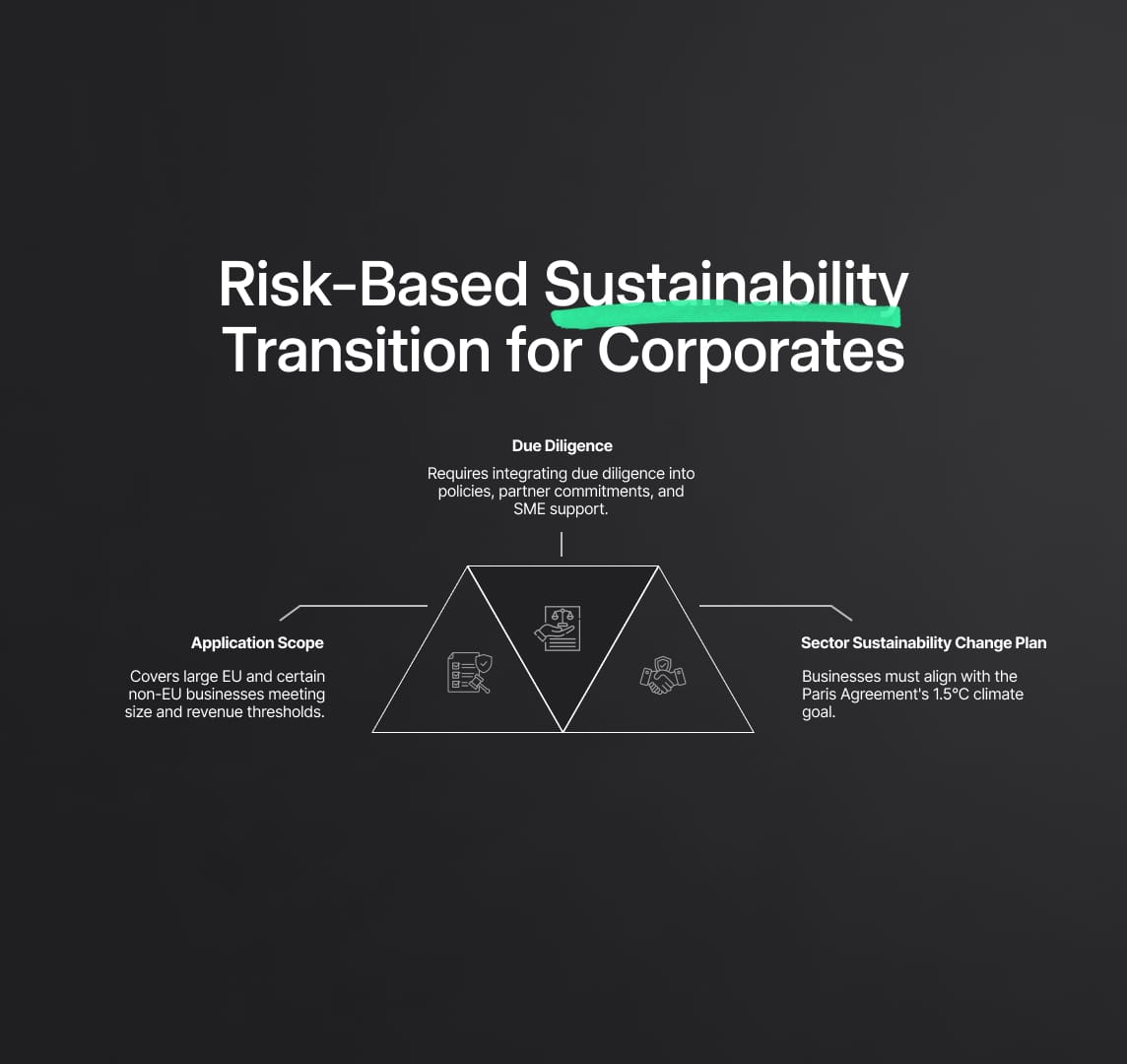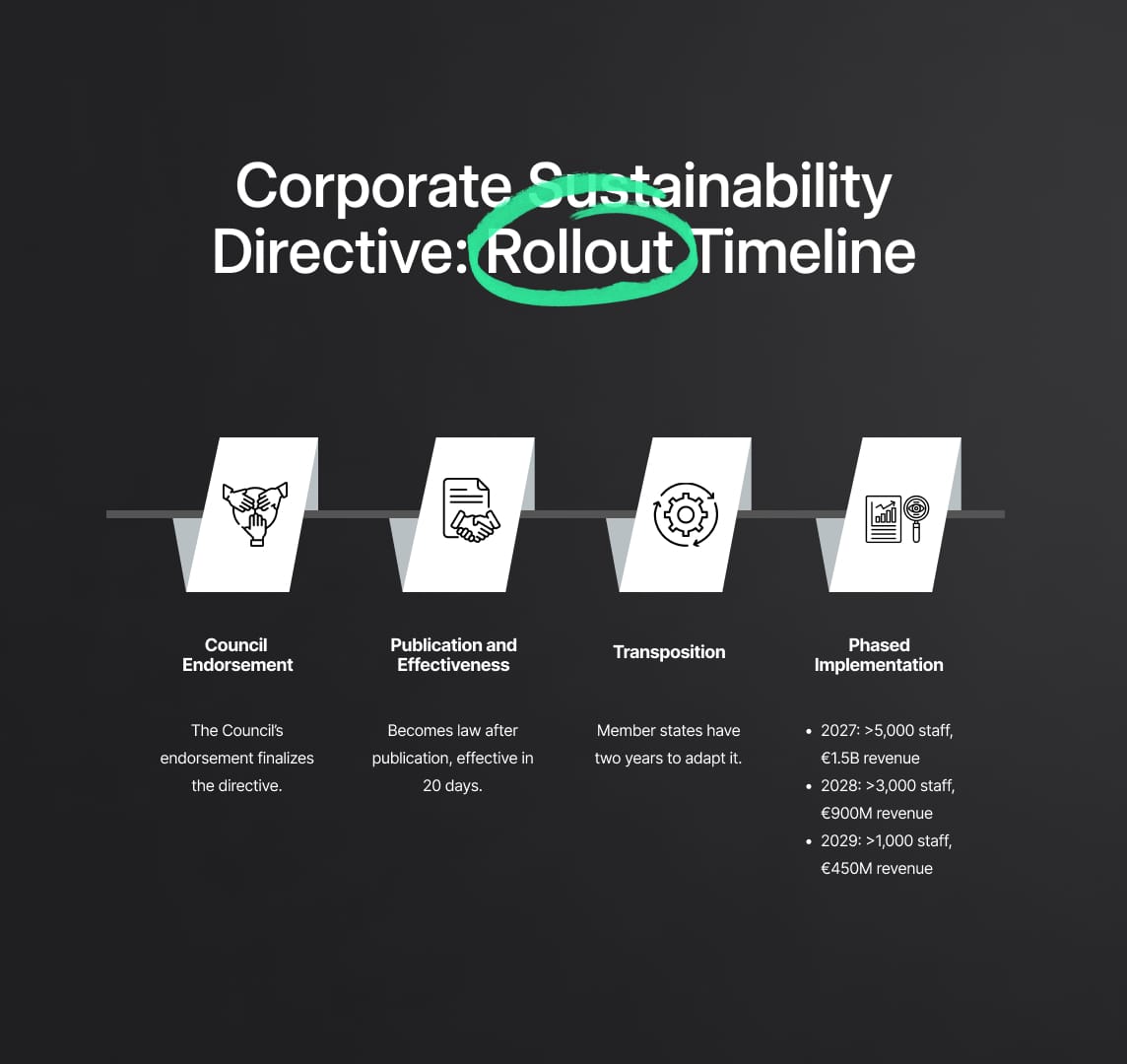EU: Corporate Sustainability Due Diligence Directive
On April 25, 2024, the European Parliament approved the Corporate Sustainability Due Diligence Directive. After Council adoption and publication in the EU Official Journal, it becomes law, mandating Member States to comply within 2 years.

The Corporate Sustainability Due Diligence Directive was approved by the European Parliament on April 25, 2024, marking a momentous occasion. The draft Directive will soon be published in the EU Official Journal (OJ), pending official ratification by the Council of the EU. The Directive will take effect twenty days after it is issued. The necessary laws, rules, and administrative provisions must be passed by Member States and made public within two years of the Directive's implementation. Article 37's transposition provisions shall apply to compliance with the Directive.

Embracing Change: Risk-Based Approach and Transition Plan for Corporate Sustainability
In a historic step toward sustainability and corporate responsibility, the European Union has imposed strict laws aimed at major international corporations. The project known as the Risk-Based Approach and Transition Plan seeks to guarantee responsibility and conformity with the climate objectives of the Paris Agreement. Below is a summary of the main ideas:
- Application Scope: The restrictions will apply to parent firms and companies domiciled in the EU that have more than 1000 employees and a global revenue exceeding 450 million euros. These regulations will also apply to companies who have EU-wide franchising or licensing agreements that produce a single corporate identity and a global turnover of more than 80 million euros, of which at least 22.5 million euros are produced by royalties. The directive will also apply to non-EU businesses who reach comparable turnover thresholds inside the EU.
- Due Diligence Integration: Covered businesses need to include due diligence procedures into their operational guidelines. To ensure compliance with the recently imposed obligations, this calls for strategic expenditures, contractual assurances from partners, improvements to business strategies, or assistance efforts for small and medium-sized company partners.
- Change Plan for Sustainability: Businesses must develop and implement a plan to change their business models to meet the aggressive climate targets set forth in the Paris Agreement. Businesses must specifically make sure that their operations help keep global warming to 1.5°C, which will lessen its negative effects on the environment and promote sustainable growth.
Reflections on the Corporate Sustainability Directive Vote
Lara Wolters, the lead European Parliament (MEP) member for the Socialists and Democrats (S&D) party from the Netherlands, spoke about her feelings following the plenary vote. She referred to the vote as a historic occasion that will help advance ethical business practices and fight the exploitation of people and the environment by dishonest companies. Wolters highlighted the difficult process of coming to an agreement on the legislation, depicting it as a laborious compromise after years of intense talks. She was proud of the progressive allies' joint efforts to bring about this result. In the future, Wolters expressed his intention to continue pushing for the directive's prompt implementation and stated his goals for further improving the sustainability of Europe's economy during the next legislative session.

Implementation Timeline and Gradual Rollout of the Corporate Sustainability Directive
With the Corporate Sustainability Directive drawing nearer to becoming law, formal approval, signature, and publication in the EU Official Journal are now being completed. The directive will go into effect twenty days after these actions are finished, starting a revolutionary journey toward ethical company practices. Below is a summary of the key actions and deadlines mentioned in the directive:
- Formal Endorsement by the Council: The European Union Council's formal endorsement of the directive is a necessary step for its legal adoption.
- Signing and Publication in the EU Official Journal: The directive will become a law after it has been endorsed and signed, as well as published in the EU Official Journal. The official announcement of the directive's enactment is provided by this publication.
- Twenty-Day Waiting Period: Following publication in the EU Official Journal, the directive will come into effect twenty days later. This gives stakeholders a short window of time to get ready for compliance.
- Transposition into National Laws: To ensure uniform application throughout the European Union, member states will have two years to incorporate the directive's requirements into their national laws.
- Phased Implementation for Businesses: EU businesses and non-EU businesses that reach comparable turnover criteria in the EU will be subject to a phased implementation of the directive's provisions, with the exception of the communication responsibilities. The following is the phased approach:
- Starting in 2027, businesses with more than 5,000 employees and a global revenue of more than 1500 million euros will have to abide by the directive's rules.
- Starting in 2028, companies with more than 3,000 employees and a global revenue of more than 900 million euros will be subject to the law.
- Beginning in 2029, any businesses that are still covered by the directive—including those with more than 1000 employees and a global revenue of more than 450 million euros—will have to abide by its rules.
European Parliament's Drive for Corporate Accountability: A Legislative Response to Sustainable Consumption
The European Parliament has continuously pushed for legislation requiring due diligence and increased corporate accountability. This program intends to promote ethical trade practices and sustainable consumption in addition to current and upcoming legislative actions like the deforestation legislation, the conflict minerals law, and the regulations against products created with forced labor. Parliament aims to enhance the ethical aspect of trade and advance a sustainable growth model by conforming to the expectations of the population, as expressed in the conclusions of the Conference on the Future of Europe.
Advancing Corporate Responsibility
A major step toward improving corporate accountability and advancing sustainable practices inside the EU has been taken with the European Parliament's ratification of the Corporate Sustainability Due Diligence Directive. The directive establishes a framework for Member States to implement the laws and regulations required to ensure compliance as it moves toward formal approval by the Council and publishing in the EU's Official Journal. The foundation for a more ethical and sustainable business environment in Europe is laid by this regulation, which includes provisions for transposition and a well-defined timescale for implementation.
Reduce your
compliance risks

